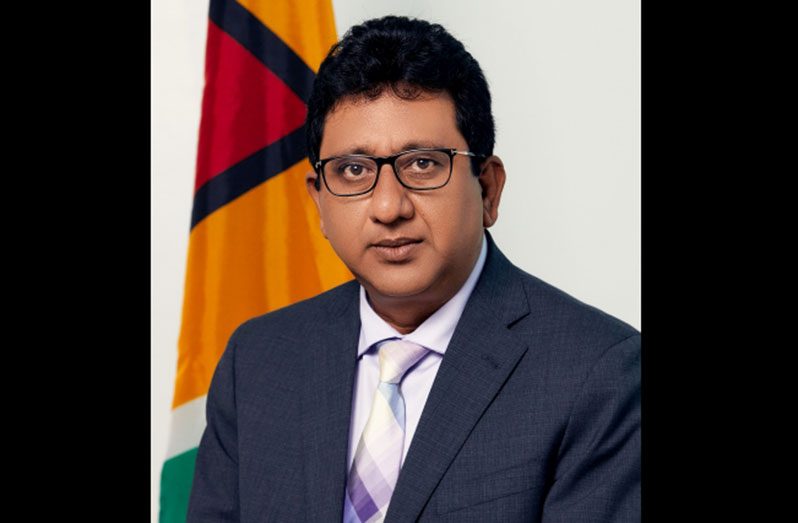–says AG in legal opinion
THE COVID-19 Emergency Measures published in the Official Gazette is grounded in the laws of Guyana and do not collide with or contravene individual rights and civil liberties as guaranteed by the Constitution.
This was expressed by the Attorney General and Minister of Legal Affairs, Anil Nandlall, S.C., in a thorough legal opinion which addresses the different strands of objections to the COVID-19 measures emanating from citizens and trade unions here.
It is the contention of the unions that the measures violate fundamental rights and freedoms guaranteed to the citizenry by the State.
But in the legal opinion seen by the Sunday Chronicle, the Attorney General wrote, “Each of the fundamental rights and freedoms asserted by the workers and their unions as being trampled upon by the COVID-19 measures are subject to a list of limitations, including measures taken that are reasonably required in the interest of public health.”
In making his argument, the Attorney General cited Justice S.Y. Mohamed in his text Fundamental Rights and Freedoms of the Commonwealth Caribbean; Justice Patanjali Sastri in the case of Gopalan v The State of Madras and Chief Justice Wooding in the case of Collymore v Attorney General of Trinidad and Tobago.
For context, Nandlall referenced Article 147 of the Constitution of Guyana which guarantees the right of freedom of assembly, association and freedom to demonstrate peacefully, as well as, guaranteeing the freedom to strike and the right to enter into collective agreements, which is subject to a number of limitations, restrictions or proviso.
Article 147 (4) (a) states: “nothing contained in or done under the authority of any law shall be held to be inconsistent with or on contravention of this article to the extent that the law in question makes provision- (a) that is reasonably required in the interests of defence, public safety, public order, public morality or public health…”
The COVID-19 Emergency Measures, which are made under the Public Health Ordinance, Chapter 1:45 of the Laws of Guyana, falls under the rubric of something “done under the authority of any law… reasonably required in the interest of public health and therefore shall not be inconsistent with or in contravention.”
“Almost every fundamental right and freedom in the Constitution is subject to a similar caveat expressed in like language. Therefore, the contention, mostly cantankerously expressed, that the COVID-19 measures are ‘unconstitutional, or violates constitutional rights’ simply have no legal basis and should be rejected as completely without merit, misconceived and wrong,” Nandlall wrote.
He reminded that the constitutionality and legality of the COVID-19 measures was examined in the case of Gobin et anor v The Attorney General of Guyana et al by a High Court Judge and was found to be proper, lawful and constitutional and that decision was upheld on appeal in the Full Court.
He also referenced a joint legal opinion by Sir Dennis Byron, former President of the Caribbean Court of Justice and Professor Rose-Marie Belle Antione to the Governments of the Eastern Caribbean which noted that the COVID-19 Measures do not abridge individual rights and freedoms guaranteed by the Constitution.
Further, Nandlall cited Sections five and 21 of the Interpretation and General Clauses Act which states that that all proclamations, direction, rules, regulations, orders and by-laws are all subsidiary legislation and, therefore, form part of the Laws of Guyana.
“The COVID-19 measures therefore, is part and parcel of the legislative corpus of Guyana like every other statute. Like every other statute, it must be obeyed and like every other statute, refusal to obey may attract sanctions and penalties,” Nandlall wrote in his legal opinion.
“Many still have grave difficulty in appreciating this legal reality. They perceive it as “guidelines” which they can disregard with impunity. Stricter enforcement may bring some reprieve to this issue,” he added.
“I will opine that the COVID-19 Measures do not interfere with, or abridge the fundamental rights and freedoms of the citizenry as guaranteed by Articles 138 to 152 of the Constitution of the Co-operative Republic of Guyana,” the Attorney General noted.
Another argument advanced is that the vaccinations constitute a violation of Regulation Nine of the Medical Practitioners (Code of Conduct and Standards of Practice) Regulations No. 22 of 2008 which mandates that every person must give their free, full and informed consent to undertake any medical intervention or treatment.
This contention is manifestly wrong as taking the COVID-19 vaccine is not mandatory, and everyone who takes it must do so voluntarily, the Attorney General said.
He also addressed allegations in relation to purported violations of the Termination of Employment and Severance Pay Act as it relates to non-payment of wages and salaries for non-attendance at work.
“This argument is extremely difficult to understand because this Act prohibits the imposition of a monetary penalty as a disciplinary measure. However, it does authorise suspension without pay,” Nandlall wrote.
“The COVID-19 Measures is law and if deduction of remuneration flow therefrom, that is the law. Based upon the instructions received, there is likely to be non-payment for absence. That cannot be construed as a monetary penalty. If at all, it bears greater generic resemblance to the concept of suspension without pay,” he added.
In concluding, the Attorney General submitted that that the COVID-19 measures are part of the statutory corpus of the laws of Guyana and are binding and enforceable against all of Guyana, as every other law.




.png)









